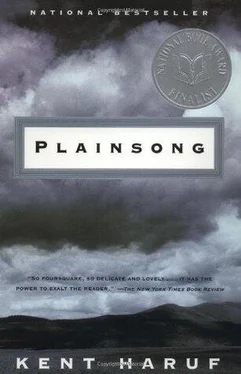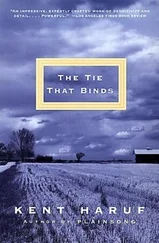You want any coffee? Raymond said.
Oh, that’s too much trouble, Maggie said.
It’s only what’s left over from noon dinner.
He set a pan on the stove and poured the coffee from the pot into it. Then he removed his cap and the hair stood up in short gray stiff shocks on his round head. She thought his head looked beautiful, had a clean perfect shape. They both looked that way. Harold had removed the greasy pieces of machinery from one of the extra chairs and had dragged it up to the table. He sat down solidly. When they were inside the house the McPheron brothers’ faces turned shiny and red as beets and the tops of their heads steamed in the cool room. They looked like something out of an old painting, of peasants, laborers resting after work.
Maggie Jones unbuttoned her coat and sat down. I came out here to ask you a favor, she said to them.
That so? Harold said. Well, you can always ask anyhow.
What is it? Raymond said.
There is a girl I know who needs some help, Maggie said. She’s a good girl but she’s gotten into trouble. I think you might be able to help her. I would like you to consider it and let me know.
What’s wrong with her? Harold said. She need a donation of money?
No. She needs a lot more than that.
What sort of trouble is she in? Raymond said.
She’s seventeen, Maggie Jones said. She’s four months pregnant and she doesn’t have a husband.
Well yeah, Harold said. I reckon that could amount to trouble.
I’ve had her staying with me in my house for a while, but my father won’t accept her being there anymore. His mind’s gone. He’s all mixed up and sometimes he gets violent. He’s made her afraid to be in the house with him.
What about her kinfolk? Harold said. Don’t she have any family?
Her father left her years ago. I don’t know how many years exactly. Now, lately, her mother won’t have her in the house.
On account of her carrying the baby?
Yes, Maggie said. Her mother has problems of her own. You probably know who I’m talking about.
Who?
Betty Roubideaux.
Oh, Harold said. Leonard’s wife.
Did you know him?
Enough to drink with.
What ever became of him, I wonder.
Nothing good. You can bet on that.
Well, he might of went to Denver, Raymond said. Then he might of went back to the Rosebud in South Dakota. I doubt anybody knows. He’s been gone a long time.
But the girl’s still here, Maggie said. That’s my point. His daughter’s still here. She’s a good person too. Her name is Victoria.
What about the sire? Harold said.
Who? she said. Oh. You mean the baby’s father.
Where does he come into this?
He doesn’t. She won’t even tell me who he is except to say he doesn’t live here. He lives somewhere else. He doesn’t want her anymore, she says. Or the baby either, apparently. Well, I don’t know if he even knows about the baby. Whether she told him.
On the stove the coffee had begun to boil. Raymond stood up and set three cups out and poured out the coffee, the pan hissing wildly as he tipped it up. The coffee was black and thick as steaming tar. You take something in it? he said.
Maggie looked in her cup. Maybe some milk?
He brought a jar of milk from the refrigerator and set it on the table and sat down again. She took the lid off and poured a little into her cup.
All right then, Harold said. You got our attention. You say you don’t want money. What do you want?
She sipped from her coffee and tasted it and looked in the cup again and set it back on the table. She looked at the two old brothers. They were waiting, sitting forward at the table across from her. I want something improbable, she said. That’s what I want. I want you to think about taking this girl in. Of letting her live with you.
They stared at her.
You’re fooling, Harold said.
No, Maggie said. I am not fooling.
They were dumbfounded. They looked at her, regarding her as if she might be dangerous. Then they peered into the palms of their thick callused hands spread out before them on the kitchen table and lastly they looked out the window toward the leafless and stunted elm trees.
Oh, I know it sounds crazy, she said. I suppose it is crazy. I don’t know. I don’t even care. But that girl needs somebody and I’m ready to take desperate measures. She needs a home for these months. And you — she smiled at them — you old solitary bastards need somebody too. Somebody or something besides an old red cow to care about and worry over. It’s too lonesome out here. Well, look at you. You’re going to die some day without ever having had enough trouble in your life. Not of the right kind anyway. This is your chance.
The McPheron brothers shifted in their chairs. They watched her suspiciously.
Well? she said. What do you think?
They didn’t say anything.
She laughed. I believe I have robbed you of speech. Will you at least think about it?
Hell, Maggie, Harold said at last. Let’s go back to the money part. Money’d be a lot easier.
Yes, she said. It would. But not nearly as much fun.
Fun, he said. That’s a nice word for what you’re talking about. More like pandemonium and disruption, you mean. Jesus God.
All right, she said. I tried. I had to do that much. She stood up and buttoned her coat. You can let me know if you change your minds.
She went outside to the car. They followed her and went down the little walk and stood at the wire gate in the freezing wind, waiting for her to back up and come forward in the rutted driveway and drive back out past the house toward the county road. As she passed she waved at them. They lifted their hands and gestured back to her.
When she had gone they didn’t talk to each other but returned to the kitchen and drank down the coffee in their cups and put on their winter caps and gloves and pulled on their overshoes and buckled them, and then went back down the porch steps into the yard to return to work as mutely and numbly as if they had been stunned into a sudden and permanent silence by such a proposal.
But later, when the sun had gone down in the late afternoon, after the sky had turned faint and wispy and the thin blue shadows had reached across the snow, the brothers did talk. They were out in the horse lot, working at the stock tank.
The tank had frozen over with ice. The shaggy saddle horses, already winter-coated, stood with their backs to the wind, watching the two men in the corral, the horses’ tails blowing out, their breath snorted out in white plumes and carried away in tatters by the wind.
Harold chopped at the ice on the stock tank with a wood axe. He flailed at it and finally broke through into the water below, the head of the axe sunken helve-deep out of sight and suddenly heavy, and he pulled it out and chopped again. Then Raymond scooped out the ice chunks with his cob fork and flung the ice away from the tank onto the hard ground behind him where it landed among other frozen blocks and pieces. When the tank was clear they lifted the lid from the galvanized watertight box that floated in the water. Inside the box was the tank heater. When they looked inside they could see that the pilot light had blown out. Harold took off his gloves and withdrew a long firebox match from his inside pocket, popped it on his thumbnail and cupped the little flame and held it down into the box. When the pilot light took he adjusted the flame and drew his arm out, and Raymond wired the lid tight again. Then they checked the propane bottle that was standing out of the way. It looked all right.
So for a while they stood below the windmill in the failing light. The thirsty horses approached and peered at them and sniffed at the water and began to drink, sucking up long draughts of it. Afterward they stood back watching the two brothers, their eyes as large and luminous as perfect round knobs of mahogany glass.
Читать дальше







